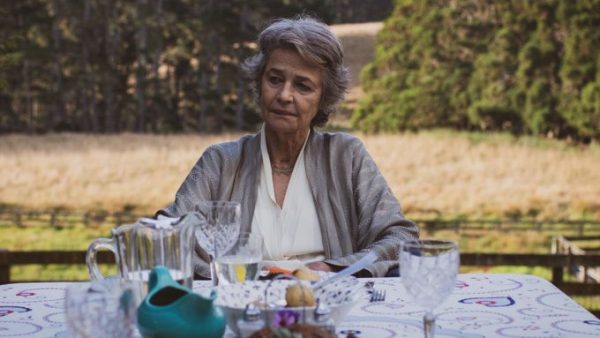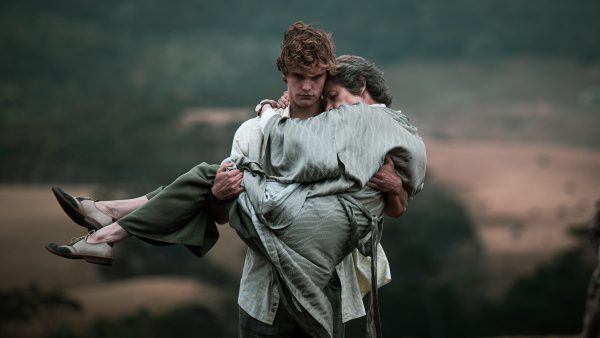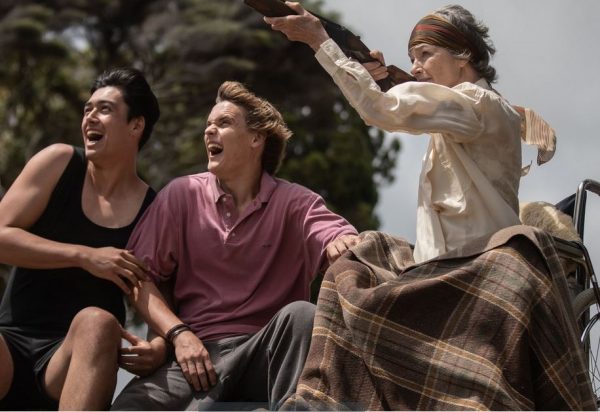
“Juniper” (2021 production, 2023 release). Cast: Charlotte Rampling, George Ferrier, Marton Csokas, Edith Poor, Cameron Carter-Chan, Tane Rolfe, Carlos Muller. Director: Matthew J. Saville. Screenplay: Matthew J. Saville. Web site. Trailer.
With summer vacation approaching, though, Robert is forced into addressing having his son around for the next few months. However, as Sam prepares to leave school and return home to his family’s farm in rural New Zealand, he learns that there’s going to be an unexpected visitor staying with him and his dad: His aging grandmother, Ruth (Charlotte Rampling), a prickly, salty-tongued former war correspondent. Having suffered a severe broken leg that has seriously hampered her mobility, she needs intense care as she convalesces, so she travels to New Zealand from her home in England to recover.
To say that Ruth is not easy to get along with is indeed an understatement. She’s fiercely independent, swears like a sailor and drinks like a fish, consuming nearly a full bottle of gin daily. She’s cooperative only when she needs to be, and she’s often a handful for her nurse, Sarah (Edith Poor), who provides (or attempts to provide) full-time care. Ruth is not especially thrilled about these arrangements, but, given her health, she doesn’t have much of a choice. She goes along with it, but she doesn’t hesitate to make her displeasure known or to bark out orders when she wants something.

What’s most problematic about these circumstances is that Sam barely knows his grandmother. Even her own son, Robert, doesn’t know or understand her well. Sam and Robert essentially have arm’s-length relationships with Ruth, compounding the emotional distance that already exists between father and son. And no sooner do the three of them settle in for the summer when Robert drops a bombshell: He’s leaving to go to England to settle his mother’s financial affairs, a task that he claims is necessary for her fiscal well-being, not to mention that of his own household. (Despite the family’s sprawling family farm, it’s suggested that the Stevenson family’s finances aren’t in the greatest shape and that, with Ruth’s advancing age and no other apparent heirs on the horizon, Robert stands to inherit what seems to be a sizable sum.) However, as Robert makes this trip, Sam is going to be left in Ruth’s company, with only Sarah present to serve as a buffer between them. Sam’s also expected to assist with Ruth’s care, something that he strongly resists but that both Robert and Sarah insist he become involved in.
Given their respective well-established personalities, Sam and Ruth get off to a rough start. He’s put off by her stern demands, especially when she’s left alone in his care when Sarah handles tasks like running errands. He’s also somewhat appalled by her confrontative outbursts, both with him and with well-meaning others who appear to have her best interests at heart. But, in response, Sam doesn’t hesitate to make his discontent known, either, speaking his mind when he believes Ruth goes too far.
Ironically, however, Ruth develops a liking for her grandson’s feisty nature. She sees a kindred spirit in him. And, over time, Sam recognizes that same trait in Ruth. Indeed, they are a lot alike. Neither of them is willing to hold their tongue. They both like to imbibe. And they share a fondness for the irreverent. As unlikely as it may seem, they forge a bond with one another, a relationship that benefits each of them, despite the unconventional nature of their connection, particularly for a grandmother and grandson.

In particular, Ruth helps Sam find himself, especially in terms of bolstering his confidence in speaking his mind and being himself. At the same time, Sam helps his grandmother recapture the spirit of her youth, a potent and perfect tonic for her at a time when her health is taking its toll. They each get something out of their connection when they need it most.
So where will all this lead? That, of course, remains to be seen. The implications of these developments turn far-reaching, especially as events take dramatic turns and Robert makes his return from England. But, no matter what happens, it becomes apparent that everyone benefits from what has occurred over the course of the summer as fall’s chill approaches.
However, this is not to suggest that all is lost. On some level, those who share Sam’s circumstances are bound to believe that there must be others like them out there somewhere, kindreds with whom they can bond, share confidences and find common ground. The key is to seek them out, perhaps putting feelers out into the Universe to draw those individuals into one’s realm of being. Of course, if that’s to happen, it takes believing in the possibility, and that’s crucial given the role that our beliefs play in manifesting the reality we experience. Such is what happens when we make use of the conscious creation process (or, in this case, perhaps more appropriately known by its alternate name, the law of attraction), the philosophy that maintains we shape our existence through the power of our thoughts, beliefs and intents. It’s unclear whether Sam has ever heard of this school of thought, but, considering the unconventional views he holds, it’s entirely possible that he might be willing to embrace it. And, in light of how events play out in this story, one could argue that he has a knack for it, too.

If nothing else, Ruth’s appearance in Sam’s world would strongly suggest this possibility. Even though they barely know one another upon her arrival, and despite the rocky start to their relationship, they find links that connect them. These bonds may not be the same as what one finds in a typical grandmother-grandson relationship, but the duo is definitely on the same wavelength for the most part. Both are radicals. Both are nonconformists. Both don’t care much for what others think of their views. And they both believe in playing by their own rules, particularly when it comes to enjoying life. One of the best examples of this comes when Ruth asks Sam if he has any friends, to which he says yes but adds that they’re mostly a rowdy, drunken lot, a response to which Ruth observes, “Sounds like my kind of people.”
Of course, despite the qualities they have in common, there are differences, too. Even though Ruth may be a little rough around the edges, she nevertheless insists on a certain degree of orderliness in her life, and she makes sure to convey these notions to Sam. For instance, she insists on buying him new clothes to give him a cleaner, neater appearance (an idea she sells by noting that the new look will give him better luck in attracting girls). Likewise, she’s miffed that the garden surrounding the farmhouse has been allowed to fall into disarray, so she talks Sam and his friends into making it more presentable (of course, she does this by bribing them with the promise of alcohol for their efforts). Some might question the wisdom of such practices, since they come with qualifiers (and somewhat questionable ones at that) to get them accomplished. But, if the tasks at hand get done and their importance sinks in for future reference, can she realistically be faulted for imparting these lessons in this way? The wisdom behind the carrot and the stick certainly springs to mind here, and it would appear to have a definite value when it comes to shaping new beliefs – and outcomes – going forward.
Sam is not the only beneficiary of this relationship, either. As Ruth witnesses his youthful exuberance, she realizes she can learn from that as well. Indeed, as someone who has led a challenging personal life, as well as a professional one in which she has seen firsthand the atrocities that humanity is capable of, the last thing she likely wants in her remaining days is to be saddled with health issues, a limited existence and condescending coddling. But, in watching how her grandson lives his life – and how he gradually goes out of his way to include her in it – she gets back some of that joy of living, partaking in fun, fulfilling activities that provide her with some of the sprightly pleasure that she relished in her younger days. It helps her feel more alive than she has in quite some time. And, with the flame of one’s life flickering ever less brightly, such an attitude can at least help to keep it burning longer than anticipated, providing much-needed light amidst the encroaching darkness.
Through all this, what we have here is an impressive act of co-creation, an inspiring, uplifting exercise in collaboration in which both protagonists participate. By pooling their energetic and belief resources, they manifest something beautiful and beneficial, a scenario in which circumstances help them attain what they were looking for and needed most. We’re all capable of doing the same when we work together harmoniously toward common ends. And, even if those ends may be a little out of the mainstream, as in this case, that doesn’t mean their materialization is any less likely when we put our minds to it.

As “Juniper” so aptly illustrates, individuals seeking to sort out their personal challenges sometimes need to work together to achieve meaningful results. What’s more, strange as it may seem, these situations often call for the formation of unlikely pairings to attain desired outcomes, as writer-director Matthew J. Saville’s debut feature so eloquently demonstrates. In many ways, the relationship between Sam and Ruth is not the kind of connection that one would expect to develop under circumstances like these, a development that gives this story a fresh take on intergenerational relations. At the same time, however, the film’s occasional reliance on a somewhat predictable narrative line and its failure to allow its innate strength to come through as fully as it might have (particularly where the revelation of motivations is concerned) is a little disappointing. Nevertheless, those shortcomings are made up for by the picture’s gorgeous cinematography of rural New Zealand, as well as the excellent break-out performance of Ferrier and the positively outstanding portrayal of Rampling, who handily turns in some of the best work of her career here. “Juniper” may not fully live up to everything it could have been, but it has a lot going for it that’s well worthwhile, especially in its ability to move audience members as the story plays out. Enjoy what makes this moving comedy-drama work, and be sure to keep those hankies handy.
Copyright © 2023, by Brent Marchant. All rights reserved.

No comments:
Post a Comment